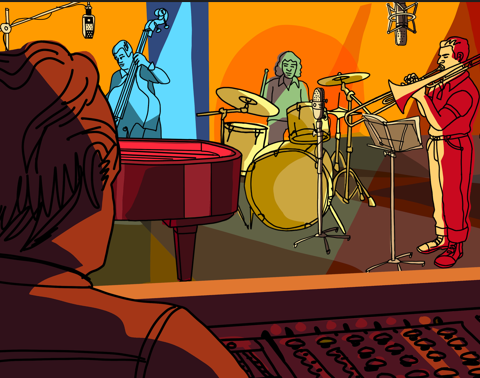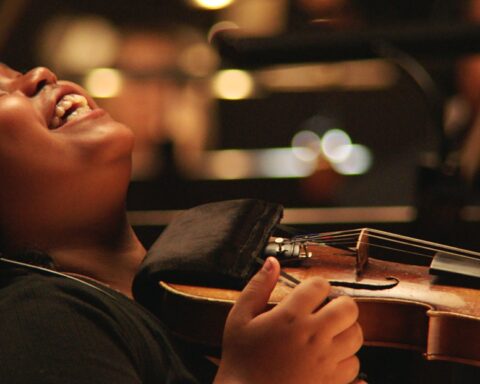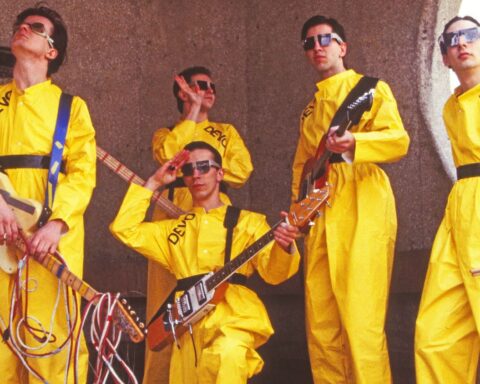What do the Bay City Rollers and Glenn Gould have in common? Not much, really, except that they were both lying open at the top of the heap in David Wall’s kitchen when I visited him at his west-end Toronto home studio.
One of this country’s most prolific film and television composers, Wall also boasts a successful career as a pop vocalist. Wall sang with Bourbon Tabernacle Choir in the late ’80s and early ’90s, and is currently the lead vocalist with the Flying Bulgars (formerly the Flying Bulgar Klezmer Band). Wall’s eclectic taste in music mirrors the multiplicity of skill sets at his disposal when he scores to picture. He is a chameleon composer.
Astonishingly, Wall has had no formal musical training, unless you count sax and clarinet lessons at the age of nine. Wall attributes part of his chosen vocation to his grade school music teacher, Ken Whiteley, and his symphonic jug band, “We learned songs all over the map with a certain kind of ‘trad’ sensibility. We sang [songs] like ‘Ain’t She Sweet’—it was really formative and crazy wonderful.” By 16, Wall was singing in the Mendelssohn Youth Choir while at the same time experimenting with R&B, “I learned how to scream, which was an important moment for me, and that informed my musical career for the next ten years.” Aside from a year’s stint at the University of Toronto studying philosophy, Wall spent most of the next decade fronting for the R&B band, Bourbon Tabernacle Choir. To this day, Wall considers himself both a dilettante and a frustrated academic.
Wall grew up in a highly secular Jewish family. “The strange thing about me is that my ethnic identity has been very recently formed. I didn’t grow up with any sense of Jewishness besides the Marx Brothers and Woody Allen movies. I had nothing. In some ways that was good. I felt like a citizen of the world.” Wall’s mother was a radical lesbian political activist. Wall Senior played clarinet at Harvard, and taught Psychology at UofT. Wall spent his weekends with his father, where he cultivated a love of classical music and opera. (Wall’s opera collection is impressive by any standard.) Wall credits much of his musical facility to years of absorbing his father’s music collection by osmosis. “For some reason there’s an added wisdom that comes with having been able to sing along with most of the Beethoven symphonies when I was a kid. At the time I just looked like a nerd. I can’t be concrete about it. I know that it’s really helped me with the kind of sensibility on how to score a picture.”
Despite his secular roots, Jewishness has become a major part of Wall’s life. Wall describes the process of getting in touch with this side of his life as coming from very negative space. “When I was with Bourbon we would do music influenced by African Americans. When we moved to New York, I started to get this crazy feeling like I was appropriating someone’s culture—like I was a bullshit artist, or a pretender. One of the reasons I quit that band was that I wanted to find something that I don’t feel guilty about, and no one’s going to accuse me of stealing.” Wall describes meeting David Buchbinder, the founder of the Flying Bulgars, as formative in shaping both his musical and cultural identities. Having to learn Yiddish for the gig presented its own challenges: “Because my Jewishness was being learned, it was like putting on Jew Face—my Jewishness was fake too,” says Wall. He studied Hebrew at university, took private lessons, immersed himself in Jewish music, and even received two grants to apprentice under Cantor Maissner of Holy Blossom Temple. Wall currently sings with the Flying Bulgars, whose music is very much about what it means to be Jewish in today’s world. “Right now it’s tough to be Jewish: the politics around Israel are so totally alienating and that bums me out. There’s actually a lot of those politics in the music of the Flying Bulgars.”
Wall recalls in the early days that Buchbinder had certain expectations of him: “I didn’t tell him I didn’t know how to do something. He’d say ‘you’re going to bring a song to sing, you’re going to have to write music, write the lead sheets, and arrange it,’ and that was completely unheard of where I came from.” But he did it. Wall embodies the essence of experiential learning: “I learn by getting a gig. I can’t drive myself to learn anything unless I promise someone that I know how to do it, and then I have to learn how to do it.”
About the same time Wall hooked up with Buchbinder, he was brokering another significant life partnership: he met and married novelist Kyo Maclear. It was through this union that Wall stumbled into scoring for pictures. His wife’s father is acclaimed documentary filmmaker and journalist, Michael Maclear. When the couple bought their first house, Maclear Senior was motivated to set his son-in-law up earning a “real income,” so he facilitated Wall’s first composing gig with Shelley Saywell. The ensuing soundtrack for Out of the Fire garnered Wall a Gemini nomination. In Wall’s words, “I guess it was beginner’s luck, and I thought, maybe I have a knack for this kind of stuff.”
Twelve years later, Wall has scored over sixty-five documentary films and television programs. He’s currently juggling two reality shows, a piece for Euro Disney and starting on his next big project, scoring the self-directed autobiographical documentary of celebrated producer, conductor, and composer John Kim Bell.
The chameleon coat Wall wears necessitates that he take on the “jack of all trades” impersonator persona. “You have to sound like Mahler for 30 seconds and then you have to sound like AC/DC for 30 seconds. It’s about being Rich Little, to be able to be convincing to approximate a zillion different genres.” At the same time, Wall is quick to point out that you have to strike a balance between believability and authenticity. “The danger in the soundtrack world is that you’re a dilettante. You do minimum research to create flavours and that is shallow and annoying.” For Avi Lewis’s The Take, Wall created an entire samba orchestra in the studio.
Wall’s self-identified forte is approximating Classical music. One of the most satisfying films he’s worked on in terms of craft was Kenton Vaughan’s doc The Museum, chronicling the remodeling of the Royal Ontario Museum. The soundtrack is reminiscent of Vaughan Williams’ music, in Wall’s estimation: “Somewhere between modern and soupy soundtrack, but enough of a kind of model or impressionistic aspect. It’s not Vaughan Williams, but I came at the same mood through my own palette.”
A self-professed people-person, Wall often brings in live musicians to complement his midi-synthesized orchestral music. It’s a technique that he finds not only makes the music sound more believable, but also makes the process more engaging. “I would always rather use real musicians. Sometimes if there’s enough money, and I could get by with a sample, I will hire a real player just to hang out with somebody.”
Wall sees his role as composer on one level as “near the bottom rung in the hierarchy of the making of a film project.” On the other hand, he sees himself as having “such power over the emotional landscape of the project.” In his element when he’s working closely with the director, Wall prefers a process where there’s intensive and detailed interaction to establish a cue-list with very specific time codes. Alan Zweig’s A Hard Name is about the rehabilitation of ex-cons. “The message—and information in it—was so important, and so politically astute and so useful, that I just felt great doing it. The director was so emotionally involved in it that of course he was going to come here; I was going to go watch the edit and meet the subjects in the film. I became a collaborative artist.”
At the other end of the spectrum, there are projects like a recent Simcha Jacobovici doc, where there was wall-to-wall music, and he sent the final cut with temp music, and expected to deliver in 10 days with minimal or no human exchange, except for email.
One of the most creatively intense projects Wall has ever been involved with was John Greyson’s operatic docu-drama, Fig Trees. “John is one of the most remarkable artists I’ve ever met,” says Wall. “He has too many ideas. They sweat out of him. He’s constantly changing things and thinking up whole new chapters and concepts at the last second. I can’t imagine a more wonderful collaborator.” Phase one was a sound installation at the Oakville Gallery in 2001, where Wall and Greyson worked “luxuriously” for over a year with instrumentalists and opera singers on eight scenes. Phase two was the creation of the film, where Greyson often delivered lyrics to Wall to score the night before they went to shoot. “I often worked ’til 3 or 4 in the morning. I had to improvise vocal lines and then didn’t deal with the accompaniment until later. I just recorded the vocal lines either a cappella or with just the most minimal guide tracks and then as much as a year later I filled in everything else.” That was phase three, the post: “Once we had filmed, then it became extremely luxurious. I’d send my tracks to John and his assistant. They would then edit the crap out of them, making them smaller, asking for more—slowly, over time, they’d edit the film. Then they’d give it back to me, and I’d recompose, and then they’d do it again. It was an incredibly organic and wonderful collaborative process.”
Unlike any other film project he has been involved in, Wall was physically featured as integral to the filming process. “It did not come naturally to me. There’s a big difference between getting up on stage and singing in different genres that have enormous spontaneity. I’m used to a bar, and having this enormous freedom. In film everything is infinitesimally pre-planned and blocked and this close to your face.
“If I had my druthers,” admits Wall, “I’d be doing the contemporary classical stuff all the time, because that’s moved me most of my life.” But Wall doesn’t have his druthers. Not only is the industry moving more and more into techno-driven self-sufficiency with minimal human contact, Wall’s circumstances tend to call a lot of the shots these days. The father of two and in his early forties, Wall’s at a stage in his life where the hardcore reality of providing for his family largely dictates where he focuses his creative energies. According to Wall, he spends 80% of his time scoring for picture, and of that time, he estimates that nearly 75% of it is spent “gigging for money.”
Clearly, if Wall really had his other druthers, he’d shift the balance more towards singing. “More and more [the film/TV composing] has eclipsed singing. The singing has definitely been sacrificed. Part of that is willful. I’d like to figure out a context to do more singing. I really do miss it. It’s a physical longing.”
Ironically, it’s working incognito that differentiates performing from scoring and attracts Wall to the craft. “I really enjoy certain aspects of scoring to picture. It fits with me; I wear it well, I think. There’s a kind of blissful anonymity to it. [Unlike singing on stage] I’m not the centre of attention. The music is not the point of it. The music is one ingredient, which I really, really like.”
Wall is far from bitter, and seems to approach every project he takes on with gusto and wide-eyed wonder and enthusiasm. He says, “I love it! I get to be involved in all these different fascinating projects. Even when I’m complaining about them I’m still learning something. I get to add my spice, my emotional content to all these different projects. I’m making a living as a musician, and who does that?” Answer: David Wall.











